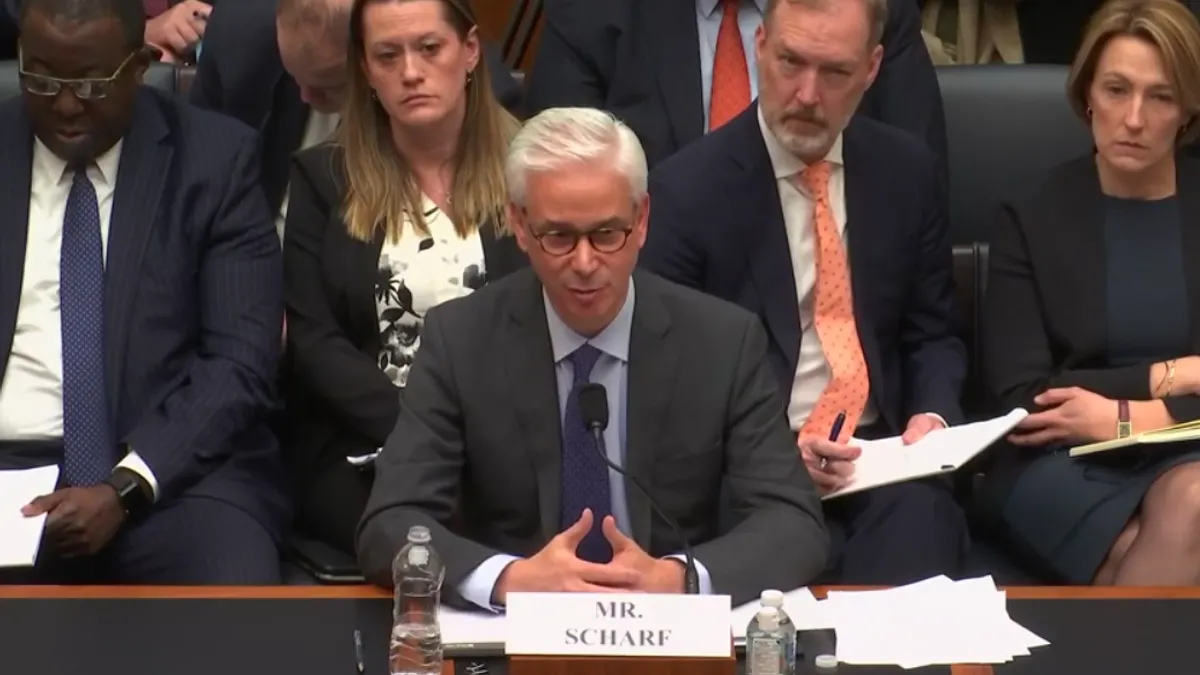Dive Brief:
-
Wells Fargo CEO Charlie Scharf said the bank’s widespread consumer abuses were the result of the institution’s "flawed business model" and "broken" culture during a four-hour congressional hearing on Tuesday.
-
Scharf’s hearing in front of the House Financial Services Committee was the first of three this month that focuses on the scandal-plagued bank.The institution has been under scrutiny from lawmakers and regulators since 2016, when Wells Fargo employees were found to have created roughly 3.5 million fake accounts to receive sales-based incentives.
-
Scharf, who joined the bank in October, told lawmakers Wells Fargo’s structure was "problematic," and the company’s leadership failed its stakeholders. "Our culture was broken, and we did not have the appropriate controls in place across the company," he said.
Dive Insight:
Scharf became the third Wells Fargo CEO in three years to face the committee. He joined the bank after its consumer abuses came to light and largely escaped the drilling that former Wells chief executives faced in the past.
But the former CEO of BNY Mellon and Visa was grilled by House Financial Services Committee Chairwoman Maxine Waters, D-CA, over the bank’s remediation plans and the length of time it anticipates it will take to make consumers whole in the aftermath of the scandal.
"As of now, our plans take us into 2021 to ensure that all of the payments are made appropriately," said Scharf when asked how soon customers that were harmed by the bank would be compensated. "We’re taking a fresh look at how we do remediation to make sure we’re being as thorough as we possibly can and remediate everyone."
Scharf’s hearing follows a scathing House report criticizing the bank’s board and senior management for their failure to comply with consent orders issued by regulators in response to the bank’s widespread consumer abuses.
Former board Chair Betsy Duke and member James Quigley, who were prominently mentioned in the report, announced their resignations days after its release.
Duke and Quigley, however, are still expected to attend their own hearings before the House committee Wednesday.
In Scharf’s testimony, he told the committee part of his plan to steer the bank away from its troubled past was to create an enterprise-wide risk control system, one that mirrors other large financial institutions.
"We recognize the compliance challenges that were posed by Wells Fargo’s historical decentralized, federated model," he said. "We have centralized our approach to consent order compliance under the COO. We also formed our strategic execution and operations office, which provides centralized oversight and facilitates a coordinated response to our compliance issues."
Scharf told the committee he spends about 75% of his time on regulatory issues.
Wells Fargo is currently operating under an asset cap set by the Federal Reserve, and there’s no clear indication of when the regulator plans to lift it. The bank is also operating under more than a dozen consent orders from various other agencies.
The hearing highlighted the differing views held by Republicans and Democrats over what contributed to the bank’s misdeeds.
Democrats repeatedly referred to the country’s fourth-largest bank as "too big to manage" while Republicans’ said size was not an issue, rather a lack of regulatory oversight contributed to the bank’s widespread consumer abuses.
Scharf joined the San Francisco-based bank last fall and has since initiated a series of changes, including restructuring the bank’s business units, introducing a new no-overdraft fee account, raising the minimum wage, and putting an end to the bank’s policy of mandatory arbitration for employees claiming sexual harassment.
"The sense of urgency that people are working with inside the company is very different today than it was four months ago," Scharf told the committee.
Last month Wells Fargo agreed to pay $3 billion to the Department of Justice (DOJ) and the Securities and Exchange Commission (SEC) as part of a settlement over the bank's fake-accounts scandal.
The bank was also ordered by the SEC this month to pay $35 million to unsuspecting clients harmed by its high-risk investment advice.













